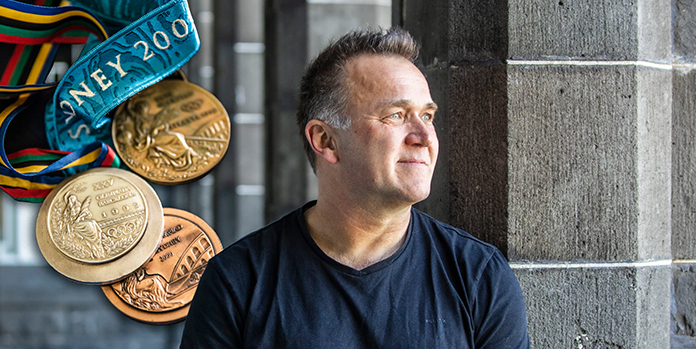Lachlan Dreher (OM 1984) is one of Melbourne Grammar’s greatest athletes. A triple Olympian, the renowned hockey goalkeeper represented Australia in 162 matches during his 14-year international career.
Having recently been inducted into the Hockey Australia Hall of Fame, and with a string of medals to his name, he still plays regularly purely for the love of the sport.
“You don’t play for the recognition, you play for the team’s success,” Lachlan says. “I’ve had some very proud moments, like being able to have my family see me at the Sydney Olympics, but I didn’t get there without their support. You don’t do it in isolation.”
“These Hall of Fame inductees are the superstars of our sport,” said Hockey Australia President Ross Sudano on inducting Lachlan, along with four other players, into the Hall of Fame. “They each brought that sense of magic.”
From default position to international stage
Lachlan began playing hockey from a young age and, having ended up in the position of goalkeeper at his hockey club by default, Lachlan was soon playing in both the Under 14 and Under 16 state teams. He joined the Melbourne Grammar First XI in Year 10, made his international debut in 1989, and represented Australia at Olympic level in 1992, 1996 and 2000.
“You’d do it forever if you could,” says Lachlan, who hopes to play in the World Masters Cup next year. “There’s plenty of hard work, but fundamentally it’s good fun.”
“My advice to any young player would be to never focus too much on the outcomes,” Lachlan adds. “Things will go up and down, there’ll be a roadblock, and if your focus is skewed toward something like selection, you’re likely to give up at that point.”
Why playing a strategic game matters
“A lot of what I do as a goalkeeper comes down to strategy,” explains Lachlan. “I can see much of the field from where I stand. If I can organise the team, and position myself and my teammates well, we’ll generally have a good game.”
“A lot of players think that as defenders, they have to get the ball back from the opposition as quickly as possible,” he says. “That is not always the case. As long as you can contain the player with the ball, it gives you time to set the field in the way you want it to prevent them having the opportunity for a good shot at goal.”
Detachment is another important aspect of Lachlan’s approach. He emphasises focusing only on the things that are possible to change—a lesson he aims to impart to young players.
“The only things you should worry about are the things you can control,” he says. “Within a match, when something goes wrong, it’s a learned skill to be able to put what’s just happened aside. It’s not easy, but if something goes wrong and you dwell on it, you’re not focused on your next thing, which is now the most important.”
International tournament highlights
Olympic Games
| 2000 | Sydney | 3rd |
| 1996 | Atlanta | 3rd |
| 1992 | Barcelona | 2nd |
World Cup
| 2002 | Kuala Lumpur | 2nd |
| 1998 | Utrecht | 4th |
| 1990 | Lahore | 3rd |
Champions Trophy
| 2001 | Rotterdam | 2nd |
| 2000 | Amstelveen | 5th |
| 1999 | Brisbane | 1st |
| 1998 | Lahore | 3rd |
| 1997 | Adelaide | 2nd |
| 1995 | Berlin | 2nd |
| 1994 | Lahore | 4th |
| 1993 | Kuala Lumpur | 1st |
| 1992 | Pakistan | 2nd |
| 1991 | Berlin | 4th |
| 1990 | Melbourne | 1st |
| 1989 | Berlin | 1st |



